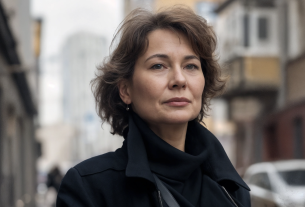I don’t print money!” Irina threw her purse onto the table and tiredly rubbed her temples. The cheap watch with its worn strap showed nearly eleven at night.
Anatoly didn’t even lift his eyes from his phone. The bluish glow of the screen lit up his stubbly face.
“Could you at least wash the dishes? I’m dead on my feet after two shifts,” Irina pushed a stray lock of hair behind her ear.
“I’ll wash them tomorrow,” Anatoly muttered, still scrolling through his endless social‑media feed.
Irina looked around the kitchen. For three days dirty plates had towered in the sink. Empty jars lined the windowsill. Their apartment—once always neat and cozy—now looked like a lair.
“Tolia, we need to talk,” Irina perched on the edge of the sofa.
“Starting again?” her husband grimaced and set the phone aside. “Let’s do it tomorrow, okay? I’ve got a splitting headache.”
“Your head splits every day!” Irina’s voice shook. “Six months have passed—you haven’t even written a résumé!”
Anatoly leapt up, his face twisting.
“You think it’s easy to find a decent job without connections? I’m not becoming a taxi driver or a courier!”
“Nobody said taxi! But you have to do something,” Irina sighed. “Our savings are vanishing. Yesterday you withdrew five thousand. For what?”
“Are you spying on me?” Anatoly grabbed his jacket. “I’m a man! I have the right to relax with my friends!”
“While I work two jobs?” Tears welled in Irina’s eyes.
Once they had dreamed of a big house, children, travel. Now all their conversations were reproaches and excuses.
“I need some air,” Anatoly headed for the door. “Don’t wait up.”
The door slammed so hard that a cup on the table jumped. Irina collapsed onto the sofa and buried her face in a pillow. It smelled of chips. Once Tolia used to bring her roses for no reason. Now every talk felt like a battlefield.
She opened her mobile‑bank app. A little over twenty thousand remained in their joint account; her salary barely covered rent and food. Soon she would have to dip into the second account—the money she’d been saving for a car.
Her phone buzzed. A message from her friend Katya: “How are you? Holding on?”
Irina gave a bitter smile. Holding on? She was clinging by her fingertips to a marriage falling apart—to a husband who’d turned into a stranger.
She glanced at the wedding photo on the wall: Anatoly in a sharp suit, her in a white dress—happy, in love. Where had that time gone? When had Tolia stopped being her support and become a load she carried?
Irina knew something had to change, or the endless struggle would crush her. But she still loved her husband and still hoped the old Anatoly would return.
In the morning Irina woke before the alarm. Her eyes were puffy, her head heavy. She tiptoed into the kitchen so as not to wake her husband, who had staggered home at dawn and was now snoring on the sofa.
After brewing tea she glanced at the calendar: Wednesday—her extra shift at the mall’s accounting office. Eight hours with numbers, then another four in the evening.
“Wish I could take a day off,” she muttered, massaging her temples.
The phone buzzed: her boss unexpectedly said she could leave at noon—reports were in early. She finished her second job quickly, too.
For the first time in six months fate handed her a gift. The spring sun warmed her face, and she decided to walk home—the stroll was only twenty minutes.
Near her building she slowed. Their apartment window was wide open and she could hear Anatoly’s voice—loud, almost cheerful. He rarely spoke on the phone.
Irina unlocked the door quietly. The hallway was dark; Anatoly’s voice came from the kitchen.
“Mom, don’t worry, I’ve thought everything through,” he said, sounding upbeat—tones Irina hadn’t heard in months. “Now’s the perfect time to invest in real estate. That dacha outside town is ideal.”
Irina froze, pressing against the wall.
“We’ll use your savings and ours with Irka—just enough,” he went on. “The dacha will be in my name, of course. Irka doesn’t need to know.”
Her heart pounded. Her husband and mother‑in‑law were planning to spend their joint money behind her back!
Irina slipped out, hurried to the bank, and transferred the entire nest egg to her mother. Then she came home, slammed the door as if returning from work, and started packing Anatoly’s clothes.
“Tolia, I washed your T‑shirts—putting them away!” she called. He grunted, glued to football on TV.
Soon two suitcases stood in the hallway. Irina straightened her blouse and turned off the television.
“Tolia, we need a serious talk.”
“Hey! The game’s on!”
“It’s decisive all right,” Irina folded her arms. “I want you out tonight.”
He laughed—until he saw her face. “Are you crazy?”
“I’d be crazy to stay with you one more day. I heard everything about the dacha, about spending my savings.”
He lunged for his phone, checked the balance, raced to the laptop—and screamed.
“Ira! Where’s the money? The account’s empty!”
“It’s in a safe place—at Mom’s,” Irina said calmly. “I earned that money, especially these last six months while you lay on the sofa.”
“They’re my money too! I’ll call the police!”
“Call them. We’ll discuss how you’ve lived off me since quitting without telling me.”
He saw the packed suitcases. “This is my apartment!”
“It’s a rental—and I’ve been paying for it. Leave now or I call the police and say you’re threatening me. Who’ll they believe?”
Anatoly stared at her. The meek Irina was gone.
“You’ll regret this,” he muttered, dragging the cases out. “Mother won’t forgive you.”
“Say hi to Polina Yevgenyevna,” Irina smiled. “Tell her to save for that dacha herself.”
The door slammed; a porcelain figurine—his mother’s gift—shattered on the floor. Irina sat on a chair and wept, not from sorrow but from relief.
Calls and texts from mother‑in‑law flooded her phone. She blocked every number. Anatoly alternated between begging and threats. A month later Irina filed for divorce, attaching statements proving her income and his idleness.
After the divorce she stood in a car showroom, hand on a shiny hood. Not the brand‑new model she once dreamed of—but the one she could buy with her savings.
“I’ll take it,” she said firmly.
Paperwork done, Irina settled into the driver’s seat and switched on the radio. Her wedding song played. She reached to change the station—then realized she felt no pain, only a gentle nostalgia for times past.



